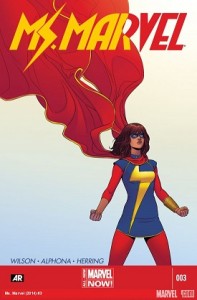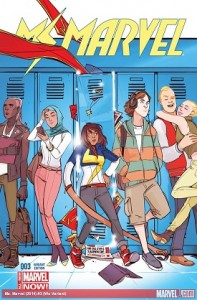 Note: This post contains spoilers for those who haven’t read the third issue of Ms. Marvel. Issue #3 is available for purchase on Amazon and Comixology.
Note: This post contains spoilers for those who haven’t read the third issue of Ms. Marvel. Issue #3 is available for purchase on Amazon and Comixology.
Issue #3 of Ms. Marvel opens with a news report about Kamala’s rescue of her friend Zoe. Rather than celebrating her newfound fame or fretting about the safety of her family, Kamala looks aghast: “I am so dead.” Though not explicitly drawn out, her statement recalls the anxieties of many immigrant children hiding secrets from their parents.
She proceeds to do what any modern tech-savvy teenager would do when they wake up with unexplainable super powers: she Googles it. This is one of a series of clever twists that G. Willow Wilson offers up to veteran readers of comic book origins tales and reboots. Adrian Alphona’s art marries well with Wilson’s writing style; it has an unusual, slightly off-kilter texture and Alphona stuffs each panel with side jokes and bustling activity.
The title in some ways has been a postmodern take on the origin story with all the classic Marvel tropes. Alliterative super hero? Check. Foreshadowing by a spiritual guide? Check. General confusion and angst? Check.
However, Ms. Marvel #3 also breaks new ground. There isn’t much of the hand-holding common to stories about non-Western religions. [pullquote align=”right”]There isn’t much of the hand-holding common to stories about non-Western religions.[/pullquote]Instead Wilson drops Kamala directly into a mosque environment. She is castigated by the imam for speaking during his lecture. This leads to Kamala debating him from behind a partition on gender segregation in the Muslim community. This is a bold creative decision by Wilson to present such a controversial and important debate about mosque inclusion so early in the book.
I found myself wondering what a non-Muslim interpretation of this scene would be. Somewhat at the expense of depicting the broader debate about mosque inclusion in a sophisticated way (see the upcoming documentary Unmosqued for another look) the scene effectively characterizes Kamala’s bravery and intelligence.
The rest of Issue #3 deals with Kamala’s strained relationship with her friend Bruno after he informed the Khans when Kamala snuck out to a party in Issue #1. Issue #3 also deals with Bruno’s nitwit wannabe-thief brother and Kamala’s unwitting experimentation with her powers.
In one particularly humorous moment, Kamala attempts to see if she can transform into anybody other than Carol Danvers but she accidentally transforms into her mother. “Okay, I was totally going for Taylor Swift. This is getting Freudian,” she says as she views herself in the mirror, dupatta, hair bun and all.
This is a continuation of Wilson’s elegant usage of Kamala’s shapeshifting power as a metaphor for issues of self-perception and beauty standards. When Kamala transformed into her ideal self in Issue #1, it is blonde, All-American Carol Danvers. Despite her expectations, revealing superhero clothing and blonde hair did not make her feel beautiful.
In this issue, despite wanting to transform into Swift, another white icon of beauty, she transforms into her mother. Of course, as Wilson hints, Kamala (and readers like her) cannot ever fully be Carol Danvers nor fully her Ammi. Instead, she needs to take inspiration from both and create something beautiful, empowering and radically new — for Kamala, this will mean eventually taking shape as the new Ms. Marvel. The new costume design, shown off fully on #3’s cover, is a blending of superhero clothing with kurtas, churidars and dupatta’s.
The issue ends with Kamala stepping in to prevent Bruno’s store from being robbed. [pullquote]She decides that people don’t expect a superhero to be “a sixteen year old brown girl with a 9 p.m. curfew.”[/pullquote]Before intervening, she decides that people don’t expect a superhero to be “a sixteen year old brown girl with a 9 p.m. curfew” and transforms into Carol Danvers once more. The issue also ends with another cliffhanger and some mildly confusing facial work by Alphona. There isn’t quite enough context to know what Wilson is building towards with this particular scene.
In issue #2, it was her father’s quoting of the Qur’an that encouraged her to save Zoe’s life, which seemed potent and sweet in the context of her father grounding her. In this issue, stopping a robbery makes Kamala feel empowered, though it seems like her intervention actually made the situation between the robber and Bruno more difficult than it needed to be. Unfortunately, the ending feels a little half-baked, but this creative choice could easily be redeemed in the next issue.
As a final note (and as a new reviewer for The Aerogram), I wanted to raise one thing about [pullquote align=”right”]The comic reinforces the repressive Muslim man trope.[/pullquote] the last few issues. Ms. Marvel has thus far subverted the vast majority of tropes that have plagued depictions of Muslims in comics, but it slightly troubles me that in the service of building Kamala’s heroism and charm the comic reinforces the repressive Muslim man trope.
 Her father and brother are portrayed as caring deeply about Kamala, but most of Kamala’s issues revolve around the fact that her father is mildly conservative and controlling, although not on religious grounds. She is grounded for ‘disobeying’ him and by sneaking out to a party, Meanwhile, her brother is mocked as an overbearing, out-of-touch and out-of-work religious Muslim. The imam that Kamala debates is depicting as being a clear hypocrite and spouting stereotypical nonsense about gender.
Her father and brother are portrayed as caring deeply about Kamala, but most of Kamala’s issues revolve around the fact that her father is mildly conservative and controlling, although not on religious grounds. She is grounded for ‘disobeying’ him and by sneaking out to a party, Meanwhile, her brother is mocked as an overbearing, out-of-touch and out-of-work religious Muslim. The imam that Kamala debates is depicting as being a clear hypocrite and spouting stereotypical nonsense about gender.
To be clear, these are characters familiar to anyone raised in a Muslim/South Asian American household and Wilson does attempt to differentiate them from simple stereotypes. The father and the brother are given the benefit of being full characters, but the depiction of the imam troubled me for its simplicity.
Although though they reinforce certain tropes, the men and women in Kamala’s family are significantly more realistic and nuanced than earlier depictions of Muslims in Marvel comics. It is still early in the Khan family’s story and I am eager to see more of Wilson’s deft integration of real Pakistani Muslim-American experience and the metaphorical toolkit of the Marvel universe.
With additional editing by Anita Felicelli.
Ahmed Ali Akbar is a graduate student at Harvard Divinity School, focusing on race, class and history of American Muslims and South Asian diaspora. He is editor of Rad Brown Dads (radbrowndads.tumblr.com) and a contributor to Salaam, Love: American Muslim Men on Love, Sex and Intimacy.












